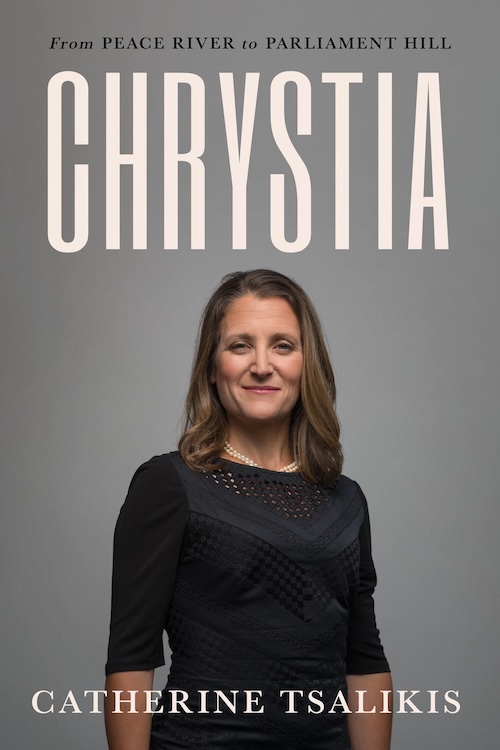January 10, 2025
Chrystia, by Catherine Tsalikis

It was 2018 and I was riding the subway with my husband and kids toward Bloor/Yonge Station when I started eavesdropping on the family behind us who were discussing the ongoing postal strike, the parents asking smart questions and the kids (who were a little bit older than mine) asking smart questions back, all of them engaging with ideas. Intrigued, I turned around to spy on them, and will admit that the thing I noticed first was that the parents in this very smart family were schlumping about in track pants (ie they were about as well put together as I was). It wasn’t until we’d all disembarked from the train that I realized the mom in question was Chrystia Freeland (my Member of Parliament since 2015; her office sends me a card every Christmas, sometimes two by accident) and by then they’d disappeared up the escalator.
“As her friend,” wrote Katharine Lake Berz a few weeks ago in a Toronto Star about Freeland in the wake of her departure from the federal cabinet, “I have witnessed in her something vanishingly rare in public life: [Chrystia’s] character never wavers, whether she’s addressing world leaders or chatting about her children over coffee.” It was a description that resonated with my own fleeting impression of her in the wild, and which was only underlined by Catherine Tsalikis’s just-released biography.
Chrystia: From Peace River to Parliament Hill, was supposed to come out in February, but House of Anansi Press rushed it into onto shelves just before Christmas following Freeland’s unexpected announcement which led to the Prime Minister’s stament last week of his intentions to resign. And now some are hoping Freeland will step up for Liberal leadership; others crossing their fingers that she gives someone else a chance to go down with the ship before taking on the top job herself. What happens next is anyone’s guess but regardless, Freeland’s story is inspiring and fascinating, and this first book by Tsalikis—an international affairs journalist who became inspired to write this biography in 2020 when she was on parental leave with her first child—does a terrific job rectifying the dearth of stories about Canadian women in public life (as opposed to their quite happily self-mythologizing male counterparts).
Tsalikis traces Freedland’s origins from the stories of her grandparents, on the paternal side, a Scottish war bride who married a farmer from rural Alberta, and maternal, whose lives were defined by European war and turmoil in the first half of the 20th century and immigrated from Soviet Ukraine to Canada in 1948 after their daughter, Freeland’s mother, was born in a displaced persons camp. Freeland was born three weeks premature in 1968, just small enough to be tucked into a desk drawer when her mother—age 20, and finished her first year of law school—returned to work at her father-in-law’s law practice two weeks later. Freeland’s parents would later divorce, but her father’s rural Alberta roots and her mother’s Ukrainian nationalism (and progressive activism) would give their daughter’s character a strong definition. Her brightness shone from a young age, and Freeland would take part in a high school program in Italy, earn her undergraduate degree from Harvard, become labelled as a troublemaker by the KGB during a university exchange in the last days of Soviet Kyiv, and struggle just a little bit to balance the writing of her masters thesis at Oxford (where she was a Rhodes Scholar) with her reporting on the fall of the Soviet Union for the Financial Times.
Chrystia follows Freeland’s story through her years in journalism, her triumphs and professional misses, that unwavering character cited by her friend an absolute through-line, a trait which earns her much admiration and success, but also foes including Vladimir Putin and JAN WONG (who are the true main villains of this story). Tsalikis compiles her story from interviews with friends and former colleagues, and close family members (Freeland’s aunt and sister are key sources), as well as Freeland’s own journalism (she has THOUGHTS about Hillary Clinton as a potential presidential candidate in 2008), and profiles in magazines including Chatelaine and Toronto Life. The result is the portrait of a figure for whom loyalty is a fundamental trait, but who also is unafraid of standing up for what she feels is right, which has included the forces of democracy in the former USSR and as a counter to tyrants all around the world, which puts into context the recent events that didn’t make it into the book, making sense of why Freeland chose to step away from her former boss when she did.
What I loved most about this book, apart from learning the details of Freeland’s extraordinary life and also the finer grains of politics and diplomacy that I may not have understood as well during the years I was watching history unfold via a Twitter timeline, is Chrystia Freeland as an example of somebody who stands up tall before authoritarian forces (which is no small thing when you’re five foot two), how her courage and steadfastness have made her a force to be reckoned with, never to be underestimated. Chrystia Freeland is so far from an ordinary person (however she might ride the subway in such a guise) but there is a lot we can learn from her example about how to respond to our current moment, of how to be clear-eyed and fearless in the face of authoritarianism, and how we might live the values that we know to be true.





